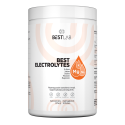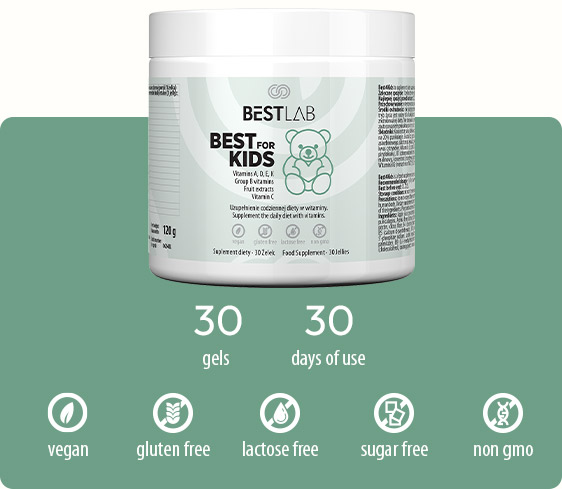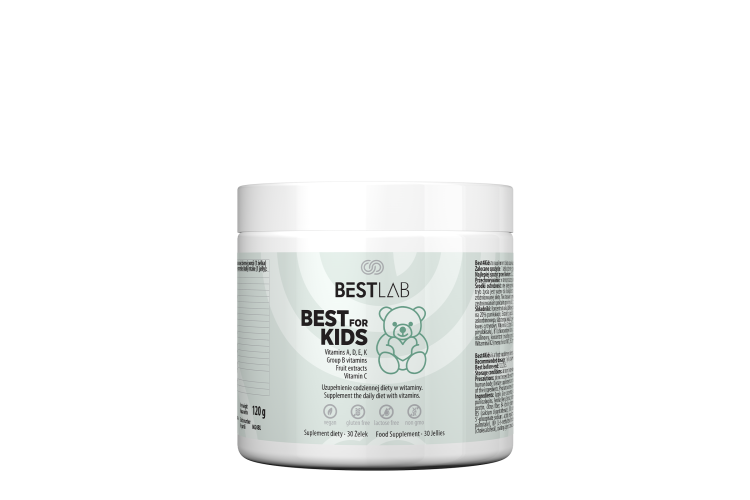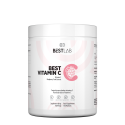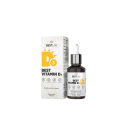BestForKids is a dietary supplement supporting childrens health. The products comprehensive formula replenishes the deficiencies of nutrients necessary for the proper functioning of childrens and adolescents bodies.
|
Active ingredients:
|
Content in the recommended daily dose (1 jelly):
|
| Bromelain from pineapple |
225 mg |
| Chokeberry extract |
50 mg |
| Cranberry fruit extract |
50 mg |
| Choline (B4) |
25 mg |
| Niacin (B3) |
15 mg (94%)* |
| Pomegranate fruit extract |
10 mg |
| Rosehip fruit extract |
10 mg |
| Vitamin E |
8 mg (67%)* |
| Inositol (B8) |
7 mg |
| Calcium D-pantothenate (B5) |
5 mg (83%)* |
| Pyridoxal 5-phosphate (B6) |
5 mg (357%)* |
| Para-aminobenzoic acid (B10) |
5 mg |
| Thiamine hydrochloride (B1) |
2.5 mg (227%)* |
| Riboflavin sodium 5-phosphate (B2) |
2.5 mg (179%)* |
| Vitamin A |
2000 IU (75%)* |
| Vitamin D3 |
1000 IU (500%)* |
| L-5-methyltetrahydrofolate calcium salt (B9) |
200 µg (100%)* |
| Methylcobalamin (B12) |
50 µg (2000%)* |
| Vitamin K2 MK7 |
50 µg (63%)* |
* Reference Intake Value
Package contents: 30 jelly beans.
Ingredients: Apple juice concentrate, Apple puree, Water, Bromelain 2000 GDU/g powder, Pomegranate extract standardized to 20% punicalagin, Chokeberry berry extract, Cranberry fruit extract, Rosehip fruit extract standardized to 50% ascorbic acid, gelling agent: citrus pectin, citrus fiber, B4 (choline bitartrate), B8 and B3 (inositol hexanicotinate), citric acid, Vitamin E (DL-alpha-tocopheryl acetate), B5 (calcium d-pantothenate), B10 (para-aminobenzoic acid), B6 (pyridoxal 5-phosphate), B1 (thiamine hydrochloride), B2 (riboflavin sodium 5-phosphate), acidity regulator: sodium citrate, natural raspberry flavor, concentrate (carrot, blackcurrant), Vitamin A (retinyl palmitate), B9 (L-5-methyltetrahydrofolate calcium salt), Vitamin K2 (menaquinone MK7), B12 (methylcobalamin), Vitamin D3 (cholecalciferol), glazing agent: carnauba wax.
Get to know the active ingredients of the BestForKids supplement
Bromelain from pineapple
Bromelain, sometimes also called bromelin, is an enzyme extracted from various parts of pineapples. It can be found in the leaves, fruits and stems. This enzyme has recently become famous, mainly due to its beneficial properties and varied effects.
Chokeberry extract
Chokeberry fruits contain ingredients with antioxidant properties (anthocyanins, flavonols, phenolic acids, tannins), vitamins (C, B2, B6, E, P, PP) and minerals (Mo, Mn, Cu, B, I, Co). From a health-oriented point of view, the most essential component of chokeberry are polyphenols, which have strong health-promoting potential. Their content in black chokeberries is up to four times higher than in blackcurrants or blueberries, considered a treasure trove of polyphenols.
Cranberry fruit extract
Botanically, cranberries belong to the heather family. The most common variety is the large-fruited American cranberry. It is a perennial, evergreen, low-stemmed plant reaching a height of 20 cm to 2 m. The characteristic spherical fruits, red or black-red in colour, resemble berries. They have thin, smooth skin with intense colour. Cranberries are a fruit with a tart, sour taste.
Pomegranate fruit extract
Pomegranate is a fruit worth including in your daily diet. It contains many valuable vitamins and minerals, primarily vitamins C, E, A, and B, with particularly large amounts of folic acid. Pomegranate also contains many mineral salts, such as phosphorus, potassium, magnesium, silicon, calcium and iodine.
Rosehip fruit extract
The wild rose is a shrub or low tree found in Europe, Asia and North America. Its leaves are broad and fleshy, and the flowers are yellow, pink or white, usually with brilliant red stalks. These flowers bloom from June to August and the fruits are edible. Rosehip is often used in herbal medicine, especially its fruits rich in antioxidants.
Vitamin A
Vitamin A is one of the substances necessary for the proper functioning of the human body - it boosts vision, strengthens the immune system, and at the same time maintains the proper condition of the skin, hair and nails.
Vitamin D3
Vitamin D3 (cholecalciferol) was first isolated from cod liver oil in 1922 by the American scientist Elmer McCollum. Still, its chemical structure was determined at a German university in the 1930s under the supervision of Professor Adolf Windaus. It influences many processes, including the regulation of calcium and phosphate metabolism, as well as has a huge impact on immunity.
Vitamin E
Vitamin E is a group of compounds called tocopherols. It is fat-soluble. It is stored in the body, mainly in fat tissue and adrenal glands. Vitamin E is an antioxidant that protects against cell damage and oxidative stress.
Vitamin K2 MK7
Vitamin K was discovered in 1930 by Henrik Dam, who conducted research on blood clotting. What properties does vitamin K have? This chemical is often referred to as the "coagulation vitamin." This is because vitamin K aids in the blood coagulation process – supporting the action of blood factors such as prothrombin.
Thiamine (vitamin B1)
The isolation of vitamin B1 is one of the most important achievements of modern medicine. This was done in 1912 by a Pole, Kazimierz Funk, who isolated vitamin B1 from rice bran. Vitamin B1 belongs to the group of water-soluble vitamins and plays several important roles in the human body.
Riboflavin sodium 5-phosphate (vitamin B2)
Vitamin B2, also called riboflavin, is an organic compound consisting of ribitol and flavin. It plays an important role in the human body. It is crucial for health, well-being and beauty. It is responsible for, among others, for the proper functioning of the immune system, good eyesight and beautiful skin.
Niacin (vitamin B3)
This compound of nicotinic acid and its amide, belonging to the group of vitamins B, jis water-soluble and temperature-resistant. Scientists believe that it is vitamin B3 that we need most of all the vitamins in this group. It has a very large impact on the proper functioning of the human body.
Choline (vitamin B4)
Choline is an organic chemical compound produced (synthesised) by the human body in small amounts, but most of it must be supplied through the diet. Choline—sometimes referred to as vitamin B4—is found in the body in the form of phospholipid compounds and plays a very important role in various transformations and processes, including those important for the proper functioning of the liver, nervous system, cognitive processes, and lipid metabolism.
Calcium D-pantothenate (vitamin B5)
Pantothenic acid is in fact water-soluble vitamin B5 found in both animal and plant products. Its synthesis also partially occurs in the intestinal flora. The D-pantothenate form of calcium is a much more stable form.
Pyridoxal 5-phosphate (vitamin B6)
Pyridoxal 5-phosphate (P-5-P) is a coenzymatic form of vitamin B6. This is a specially adapted form distinguished by its immediate and direct biological activity in the body, which allows it to act faster and more effectively in many metabolic processes.
IInositol (vitamin B8)
Inositol was once considered one of the B vitamins (vitamin B8). Nowadays, however, it is treated as a vitamin-like compound since it has been discovered that the human body can synthesise it on its own. This synthesis takes place primarily in the liver and brain. In the course of certain diseases, the bodys own production of inositol may be insufficient. Then, supplying it to the body through diet and/or dietary supplements may have a beneficial effect on its functioning. Inositol is a component of cell membranes, body fluids, glycolipids and glycoproteins.
Folate (vitamin B9)
Folates, i.e. folacin and folic acid, constitute a broad group of compounds that are pterin derivatives, which differ in the degree of oxidation and are characterised by the biological activity of folic acid.
Para-aminobenzoic acid (vitamin B10)
Para-aminobenzoic acid is a substance that is highly soluble in water. Although until recently it was known as vitamin B10, it is now called a vitamin-like compound.
Methylcobalamin (vitamin B12)
Vitamin B12, also known as cobalamin, is classified as a water-soluble vitamin. Like other vitamins, it is essential for the proper functioning of the body and should be supplied daily with food. Vitamin B12 includes a group of compounds called corrinoids. This name is related to the fact that the molecule of these compounds contains a corrin ring.
The ingredients of the BestForKids supplement positively affect childrens health, supporting the immune system, nervous system and overall development.
In order to ensure the highest quality and safety of our supplements, and above all with your health in mind, we test our products in an independent, accredited research laboratory, J.S. Hamilton.
 Wyniki badania w J.S. Hamilton.
Wyniki badania w J.S. Hamilton.
